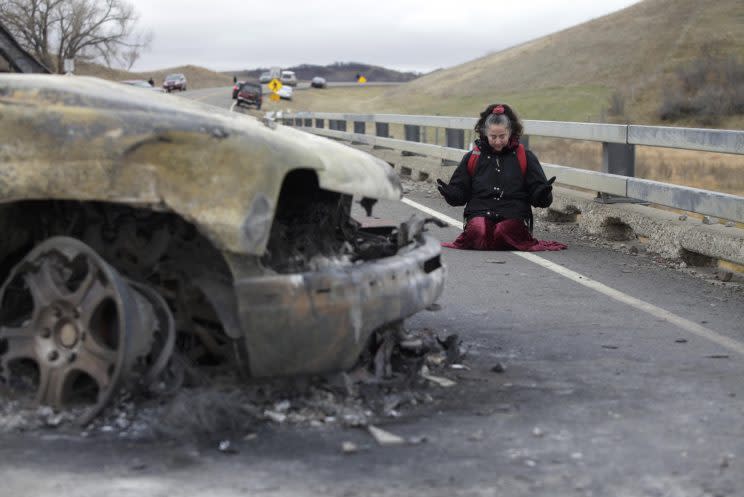Canadian banks are helping to fund the controversial Dakota Access Pipeline

Three of Canada’s big banks are under fire for their financial ties to the Dakota Access Pipeline, which has been the subject of a months-long land dispute that has turned ugly with scenes of protesters clashing with police and private security.
As reported in September by U.S. consumer rights watchdog Food and Water Watch, TD, Scotiabank and RBC are among 17 lenders funding the $3.8 billion pipeline or its owners.
While TD as lent $365 million for construction of the pipeline itself, Scotiabank and RBC have lent smaller sums to eventual pipeline operator Sunoco Logistics, and RBC is also funding the pipelines owner Energy Transfer Partners.
The dispute over the pipeline has grabbed headlines, with video of police using pepper spray and security dogs attacking protesters who claim the planned pipeline will cross traditional lands of the Standing Rock Sioux.
TD, which has the most direct funding relationship to the pipeline of the three banks, has responded to the criticism by saying it supports responsible energy development and pointing out that oil and gas lending represents less than 1 percent of its total portfolio.
“We employ due diligence in our lending and investing activities relating to energy production, and we work with our customers, community and environment groups, and energy clients to better understand key issues of concern, and to promote informed dialogue,” the bank said in a statement to Yahoo.
While the protests surrounding the construction of the pipeline are perhaps unsurprising, the focus on the lenders raises the question of to what degree should banks be held responsible for the projects they invest in. After all, they have thousands of corporate clients spread across dozens of industries and countries.
Shifting that focus is all part of the rise of socially responsible lending, which has taken off over the last 20 years, while social media and smartphones have more recently made it easier for protesters to get their message out.
“I would say that there is more attention to these kinds of issues,” says Daniel Cayley-Daoust, an energy and climate justice campaigner for the Council of Canadians, a social action group that has supported calls for TD to withdraw its investment. “Banks have definitely come under fire and have responded and have reviewed, in some cases anyway, their involvement or their ethical policies.”
The idea is to target players that stand to benefit financially form the project, not just the direct ownership or construction company.
“That’s kind of where our support for a call for TD to get out of that project comes from. As a large bank and funder, they have a responsibility to not exacerbate human rights conflicts. And similarly with environment issues, to evaluate project and if there are concerns, then reconsider their involvement,” he says.
Certainly, groups have put pressure on banks to avoid investing in ethically dodgy sectors like arms and tobacco. And many pension funds steer clear of fossil fuels or mining investments.
But where does a publicly-traded commercial bank’s responsibility lie in this case, particularly when the project in question has the blessing of regulators?
The attention currently on the pipeline and the protests may or may not be signaling a turning point in terms of the wider public’s views on aboriginal land claims and the energy sector (and fracking).
But it’s not reasonable to expect the project’s lenders to help lead the way, says Ian Lee, a former banker and current professor at Carleton University’s Sprott School of business.
“It’s a bizarre stretch… to suggest that it’s unethical for a bank to lend to a pipeline company that is publicly traded and is building a legal product pursuant to the laws of the particular jurisdiction of which it is in”, he says.
Beyond that, he says the calls for TD to simply call in its loan are unrealistic, as doing so would require very specific circumstances to avoid breaching its contract.
“You can’t just willy nilly say ‘I don’t like you, I’m going to recall your loan.’ You have to have cause and cause is spelled out in your legal agreement,” he says. “They’d be sued up the wazoo.”
Lee also points out that the Canadian financial sector is heavily and closely regulated.
While it may not be reasonable to expect a large bank to take a stand on this sort of thing, Cayley-Daoust of the Council of Canadians also sees the point of focusing on the regulations.
“I do think it’s ultimately up to governments themselves to regulate companies so that they are more attentive to this and they’re forced to consider human rights issues as serious thing, both in Canada and outside of Canada,” he says.

 Yahoo Finance
Yahoo Finance 
